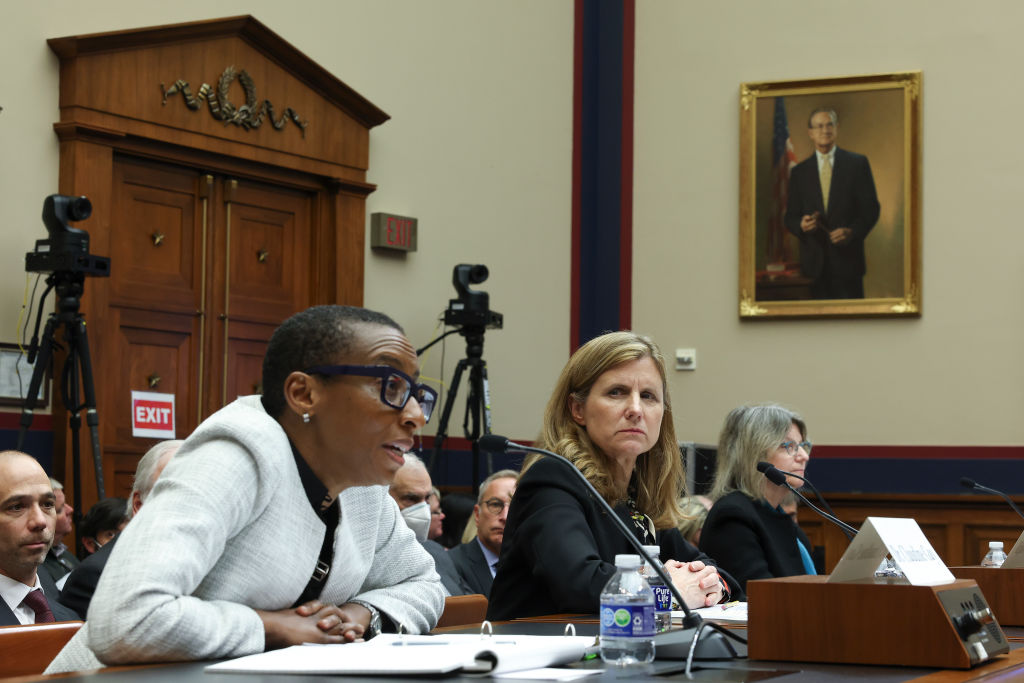Happy Monday! He ended up going with the 10-year, $700 million contract from the Los Angeles Dodgers, but Shohei Ohtani had a very competitive offer on the table from The Dispatch that would have made him one of the highest paid two-way writer/podcasters in the industry. Guess he didn’t think he could handle the heat from our comment section.
Quick Hits: Today’s Top Stories
- The U.S. on Friday vetoed a United Nations Security Council resolution that called for an immediate ceasefire in Gaza. “When it comes to a ceasefire in this moment, with Hamas still alive, still intact, and again, with the stated intent of repeating October 7 again and again and again, that would simply perpetuate the problem,” Secretary of State Antony Blinken said on Sunday, though he noted Thursday that there is a “gap” between “the intent to protect civilians and the actual results that we’re seeing on the ground.” The Israeli Defense Forces (IDF) continued its operations in southern Gaza over the weekend, engaging Hamas fighters and searching for Hamas leader Yahya Sinwar—a key priority in their campaign to eradicate the terrorist group’s leadership. The Biden administration on Friday bypassed Congress and approved the expedited sale of $106 million in tank ammunition to Israel.
- Six IDF soldiers were injured in drone attacks on northern Israel by Hezbollah on Sunday, as the Israeli Air Force launched a series of airstrikes targeting the Lebanese terrorist organization in response to the repeated attacks the Iranian-backed group has launched along the Israel-Lebanon border—including one on Thursday that killed a 60-year-old Israeli farmer. Tzachi Hanegb, Israel’s national security adviser, signaled on Saturday that outright war with Hezbollah could begin once Hamas is defeated in Gaza. “The situation in the north must be changed,” he said. “And it will change. If Hezbollah agrees to change things via diplomacy, very good. But I don’t believe it will.”
- The U.S. Embassy in Baghdad was struck on Friday with seven mortar rounds, marking the largest such attack in more than a year—though no injuries were reported and there was only minor structural damage. U.S. forces in Iraq and Syria were further targeted with drones and missiles throughout the day on Friday. No group has yet claimed responsibility for Friday’s attack, though Iran-sponsored militants have targeted U.S. military facilities in the region at least 78 times since the start of the Israel-Hamas war.
- The White House announced on Sunday a meeting scheduled for Tuesday between President Joe Biden and Ukrainian President Volodymyr Zelensky, in which Biden will underscore his “unshakeable commitment to supporting the people of Ukraine as they defend themselves against Russia’s brutal invasion.” While in Washington, Zelensky is scheduled to deliver remarks before an all-senators meeting and meet with House Speaker Mike Johnson. Zelensky participated in Argentinian President Javier Milei’s inauguration on Sunday, and met with leaders from Uruguay, Paraguay, and Ecuador over the weekend in an effort to win support from the Global South for Ukraine’s defense against Russia.
- Armenia and Azerbaijan announced on Thursday an agreement to exchange prisoners and begin work on a potential peace treaty. “The Republic of Armenia and the Republic of Azerbaijan share the view that there is a historical chance to achieve a long-awaited peace in the region,” the Armenian prime minister’s office and Azerbaijan’s presidential administration said in a landmark joint statement, drafted without an apparent mediator. “Two countries reconfirm their intention to normalize relations and to reach the peace treaty on the basis of respect for the principles of sovereignty and territorial integrity.” Previous talks have involved outside arbitrators like the U.S. and Russia, and the direct negotiations have raised hopes of normalized relations in the Caucasus following Azerbaijan’s violent takeover of Nagorno-Karabakh in September.
- Prosecutors from the anti-corruption unit in Guatemala’s attorney general’s office claimed Friday that the results of the country’s presidential elections should be invalidated, citing “irregularities” in the votes—general election and runoff—that took place this summer. The current president-elect, Bernardo Arévalo, came in a surprise second place during the general election and went on to win the runoff in August. Arévalo, who is set to take office in January, responded by saying the prosecutors are attempting a coup in response to his promises to fight corruption and graft in the political establishment. The Supreme Electoral Tribunal, which oversees Guatemala’s elections, also pushed back against the prosecutors’ claims, arguing “the results are validated, formalized, and unchangeable.” International observers—including U.S. officials—have also decried the prosecutors’ efforts as an attempt to nullify the elections.
- Six teenage students were convicted on Friday in connection with the 2020 beheading of the French school teacher, Samuel Paty. Paty had shown his class cartoons of the Prophet Muhammad while debating free expression, and Abdoullakh Anzorov, an 18-year-old Chechen, stabbed and beheaded the teacher near the school where he worked. Anzorov was killed by police at the time of the attack, but five of the students, all of them boys, were found guilty of criminal conspiracy with intent to cause violence. They helped Anzorov identify Paty but said they didn’t know he intended to kill the teacher. The sixth student, the only girl, was found guilty of making false accusations against the teacher that contributed to online backlash.
- University of Pennsylvania President Liz Magill resigned from her post on Saturday in the wake of her appearance last week at a congressional hearing on antisemitism on college campuses. Magill faced immediate calls to resign from alumni and donors—including one donor who pulled a $100 million donation. Scott Bok, chairman of Penn’s board of trustees, also announced his resignation on Saturday, but expressed support for the embattled president. Magill will stay on in an interim capacity while the school searches for her replacement.
- Tornadoes and thunderstorms hit Middle Tennessee on Saturday, killing six near Nashville and Clarksville and injuring more than 60 others. The aftermath left more than 52,000 people without power and dozens of buildings damaged or destroyed. Tennessee Gov. Bill Lee declared a state of emergency yesterday.
- John Whitmire, a Democratic state senator in Texas, defeated Democratic Rep. Sheila Jackson Lee in Houston’s mayoral race on Saturday, winning a runoff election with a decisive 64 percent of the vote. The runoff focused on public safety and policing with Whitmire running on a tough-on-crime platform. “Great cities solve their problems,” he said in his victory speech on Saturday night. “We will make this a safer city.”
Elite Colleges Offer Terrible Congressional Testimony

On December 5, the presidents of three elite U.S. universities—Harvard, the Massachusetts Institute of Technology (MIT), and the University of Pennsylvania (Penn)—testified before Congress about their institutions’ responses to the rise in antisemitism on their campuses since Hamas’ October 7 terror attack on Israel. To say it didn’t go well would be an understatement.
A grilling by Republican Rep. Elise Stefanik of New York on Wednesday had serious consequences for the three schools—public condemnations, awkward walkbacks, a looming Congressional investigation, and, for Penn, resignations at the highest level. The episode makes clear that elite universities—which already have a checkered history on free speech—are on extraordinarily thin ice with alumni, donors, and a bipartisan collection of politicians all calling on them to do better for their Jewish students as the semester draws to a close.
In the two months since Israel’s war against the terrorist organization began, antisemitic incidents on college campuses have skyrocketed. According to a November survey from the Anti-Defamation League, an advocacy organization that tracks antisemitism, 73 percent of Jewish students have witnessed or experienced some form of antisemitism since the beginning of this school year. Prior to this year, 70 percent of Jewish students reported witnessing or experiencing antisemitism at some point during their entire college experience.
The three presidents called to testify before the House Education and Workforce Committee have been embroiled in controversy over their institutional response to antisemitism even prior to October 7. Penn President Liz Magill was facing blowback from students, alumni, and donors over a “Palestine Writes Literature Festival” which included speakers whom the administration admitted had a history of antisemitic speech. “We unequivocally—and emphatically—condemn antisemitism as antithetical to our institutional values,” Magill and several members of the administration wrote in a statement ahead of the September event. “As a university, we also fiercely support the free exchange of ideas as central to our educational mission. This includes the expression of views that are controversial and even those that are incompatible with our institutional values.”
Following the October attacks, Magill and Harvard President Claudine Gay were particularly muted in their immediate condemnation of Hamas’ massacre and of their students’ defense of terrorism. At Harvard, student groups stated the “Israeli regime [was] entirely responsible for all unfolding violence”—an accusation first met with silence and then, after intense external criticism, a disavowal from Gay. Magill’s original statement condemning the attacks did not include the word “terrorism” or explicitly condemn Hamas, and she followed up with a more forceful statement almost a week later as notable donors and alumni—including former Utah governor and U.S. Ambassador to China Jon Huntsman, Jr. and private equity investor Marc Rowan—threatened to, or did, close their checkbooks.
Student protests which sometimes turned violent; a flurry of open letters winging across the pages of student newspapers, faculty newsletters, and local city journals; and threats against Jewish students and professors have all drawn the Department of Education’s attention. Both Harvard and Penn are under Title VI investigations for “discrimination involving shared ancestry.” If the private universities are found to have violated students’ civil rights, they may lose the federal funding they receive.
Congress stepped in amid this turmoil, calling Gay, Magill, and MIT President Sally Kornbluth to testify before the House Committee on Education and the Workforce. The presidents defended their conduct in prepared statements, but it was during a line of questioning about whether calls for the genocide of Jews violated the schools’ harassment policies that the university presidents decided to rediscover their long-lost free speech bona fides. (Harvard and Penn are ranked last and second-to-last, respectively, on the Foundation for Individual Rights and Expression’s college free speech rankings.)
When Stefanik pressed each president on whether calling for the genocide of Jews was against their institutions’ harassment policies—which do not have to align with the First Amendment, since they are all private universities—the administrators were evasive and equivocal. Kornbluth said “depending on the context,” such statements “would be investigated as harassment if pervasive and severe.”
Stefanik then asked Magill, “At Penn, does calling for the genocide of Jews violate Penn’s rules or code of conduct, yes or no?” Smiling softly, as if cleverly avoiding a trick question, Magill responded, “If the speech turns into conduct, it can be harassment, yes.” Pressed again, she ultimately said, “it is a context-dependent decision” whether to consider such language harassment. Bewildered, Stefanik repeated Magill’s answer to clarify: “‘Conduct’—meaning committing the act of genocide?”
Gay, when asked whether calling for the genocide of Jews violated Harvard’s bullying and harassment policies, responded, “It can be, depending on the context.” Asked persistently to clarify by Stefanik, Gay, too, repeated her answers with a smile.
Stunned, Stefanik concluded: “These are unacceptable answers across the board.”
Republicans weren’t the only ones appalled by what they heard. The Biden administration—a natural ally of the college presidents—condemned the testimony following the hearing. “It’s unbelievable that this needs to be said: calls for genocide are monstrous and antithetical to everything we represent as a country,” White House spokesperson Andrew Bates said in a statement Wednesday. “Any statements that advocate for the systematic murder of Jews are dangerous and revolting—and we should all stand firmly against them, on the side of human dignity and the most basic values that unite us as Americans.”
The White House statement was just the beginning of the high-profile and bipartisan condemnation the trio received. Democratic Pennsylvania Gov. Josh Shapiro, himself Jewish, called Magill’s testimony “shameful and unacceptable.” GOP Rep. Virginia Foxx of North Carolina, the chairwoman of the House Education and Workforce Committee, announced her panel would open a formal investigation into “the learning environments at Harvard, UPenn, and MIT and their policies and disciplinary procedures,” and threatened “the Committee will not hesitate to utilize compulsory measures including subpoenas if a full response is not immediately forthcoming.”
Faced with this far-reaching blowback, the presidents began to walk back their on-the-record testimonies. “There are some who have confused a right to free expression with the idea that Harvard will condone calls for violence against Jewish students,” Gay said in a statement posted Wednesday on Harvard’s X account. “Let me be clear: Calls for violence or genocide against the Jewish community, or any religious or ethnic group are vile, they have no place at Harvard, and those who threaten our Jewish students will be held to account.”
She then further explained her answers in an interview with the Harvard Crimson, the university’s student newspaper. “I got caught up in what had become at that point, an extended, combative exchange about policies and procedures,” Gay said in the interview. “What I should have had the presence of mind to do in that moment was return to my guiding truth, which is that calls for violence against our Jewish community—threats to our Jewish students—have no place at Harvard, and will never go unchallenged.”
The fallout for Magill was even more dire. She released a video responding to the now-viral exchange with Stefanik. “In that moment I was focused on our university’s long-standing policies—aligned with the U.S. constitution—which say that speech alone is not punishable,” she said. “I was not focused on, but I should have been, the irrefutable fact that a call for genocide against Jewish people is a call for some of the most terrible violence human beings can perpetrate. It’s evil, plain and simple.”
In the video, she revised her answer to Stefanik’s question, saying, “In my view [calling for the genocide of Jews] would be harassment or intimidation.”
But Magill’s backtracking was insufficient to undo the damage. She resigned on Saturday, as did the chair of Penn’s board of trustees, Scott Bok. Though Magill issued only a brief statement about her time as president that didn’t address the controversy that led to her resignation, Bok defended her. “The world should know that Liz Magill is a very good person and a talented leader who was beloved by her team,” he wrote. “She is not the slightest bit antisemitic. Working with her was one of the great pleasures of my life. Worn down by months of relentless external attacks, she was not herself last Tuesday.”
Bok’s explanation? “Over prepared and over lawyered given the hostile forum and high stakes, she provided a legalistic answer to a moral question, and that was wrong,” he said.
The “legalistic answer” was the problem on several levels, according to critics not just of the universities’ responses to antisemitism but also of their consistent censorship of other speech. “The thing that struck me about the presidents’ answers wasn’t their legal insufficiency, but rather their stunning hypocrisy,” David French, former Dispatch senior editor and New York Times columnist wrote Sunday, pointing out that many of their answers would be roughly, if clumsily, correct on the merits if their universities modeled their policies after the First Amendment. However, “To quote the presidents back to themselves, context matters. For decades now, we’ve watched as campus administrators from coast to coast have constructed a comprehensive web of policies and practices intended to suppress so-called hate speech and to support students who find themselves distressed by speech they find offensive.”
It’s not clear whether Gay, in particular, will continue in her post or be forced out amid mounting pressure from lawmakers and alumni. More than 70 lawmakers signed a bipartisan letter demanding the presidents’ resignations, and tensions seem unlikely to abate. “Consider,” urged Bill Ackman, a billionaire hedge fund manager and Harvard alumnus, on Saturday, “the severe reputational damage the three continue to inflict on our most important American institutions of higher learning for each hour they continue to serve in their respective roles.”
Worth Your Time
- Writing for The Ringer, Ben Lindbergh unpacks the significance of Shohei Ohtani’s historic payday and what it means for both the Dodgers franchise and Major League Baseball as a whole. “In the past several years, Ohtani has reshaped our conception of what’s possible in baseball,” he wrote. “He’s rewritten the record book and even the rule book. Now he’s rewriting the checkbook by signing the richest contract ever inked by an athlete, in unadjusted dollars. In Ohtani’s rookie season, he made the league minimum; in his seventh season, he’ll make a new maximum. His deal (which may still be contingent on a sure-to-be-rigorous physical) nearly doubles the $360 million record for a free agent, set by Aaron Judge last December. Split Ohtani’s new salary in two, and you could pay two Hall of Famers.” But the deal structure will still allow the Dodgers to spend on salary for other team members, too. “They won’t be breaking the bank by quite as much as the record-demolishing dollar figure makes it sound,” Lindbergh wrote. “Most of the $700 million in Ohtani’s deal is deferred and will be paid out after Ohtani’s 10-year tenure, Bobby Bonilla-style. Those dollars will depreciate due to inflation, which means the present value of the contract is less than $700 million—likely considerably less, though the precise parameters have yet to be reported.”
Presented Without Comment
Former President Donald Trump, on Debating in 2016 After the Release of the Access Hollywood Tape: “I went onto that stage just a few days later. And a general, who’s a fantastic general actually, said to me, ‘Sir, I’ve been on the battlefield. Men have gone down on my left and on my right. I stood on hills where soldiers were killed. But I believe the bravest thing I’ve ever seen was the night you went onto that stage with Hillary Clinton after what happened. And then that woman asked you the first question about it.’ And I said, ‘Locker room talk! It’s locker room talk, what the hell!’”
Also Presented Without Comment
Associated Press: Kevin McCarthy Endorses Trump for President and Would Consider Serving in his Cabinet
Also Also Presented Without Comment
Wall Street Journal: Elon Musk Says Alex Jones Can Return to X, Reversing His Stance Last Year
Toeing the Company Line
- Our Monthly Mailbag (🔒) is back again, and it’s senior editor and newest Dispatch hire John McCormack’s turn to answer member questions. Drop any you have in the comments here.
- In the newsletters: The Dispatch Politics crew analyzed Nikki Haley and Ron DeSantis’ approaches to running against Trump, Jonah outlined the best way to keep authoritarianism at bay, Nick examined (🔒) how right-wing media is already whitewashing a second Trump presidency, and Stirewalt predicted that (🔒) Trump will be able to reel soft supporters back in despite all his bombastic statements.
- On the podcasts: Former GOP Rep. Liz Cheney joined Steve on The Dispatch Podcast to talk about her new book, and on the latest Ruminant, Jonah discussed antisemitism on college campuses and the awfulness of Vivek Ramaswamy.
- On the site this weekend: Michael Lucchese broke down the philosophical depth of Nora Ephron’s You’ve Got Mail, and Hannah Anderson argued that our dissatisfaction with our body politic underscores important spiritual truths.
- On the site today: Joel Rayburn pillories Biden’s incoherent Iran strategy, and John Aziz provides a Palestinian perspective on the Israel-Hamas war.
Let Us Know
Do you think the university presidents’ congressional testimonies last week were disastrous enough to justify resigning—or being forced out—over? Do you think the universities will respond to the outcry by strengthening their hate speech policies or recommitting to First Amendment principles?










Please note that we at The Dispatch hold ourselves, our work, and our commenters to a higher standard than other places on the internet. We welcome comments that foster genuine debate or discussion—including comments critical of us or our work—but responses that include ad hominem attacks on fellow Dispatch members or are intended to stoke fear and anger may be moderated.
You are currently using a limited time guest pass and do not have access to commenting. Consider subscribing to join the conversation.
With your membership, you only have the ability to comment on The Morning Dispatch articles. Consider upgrading to join the conversation everywhere.